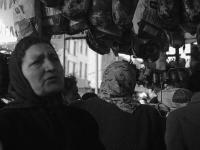Please note: the Made in America Festival will be taking place on the Benjamin Franklin Parkway during this time. Please refer to SEPTA and the Philadelphia Parking Authority for up-to-date information regarding transportation and parking.
About Becoming U.S.
Becoming U.S. is a series of programs launched by HSP in fall 2016 to encourage sharing across ethnicity, race, and citizenship status. We want to hear and learn from each other about the human endeavor of transition and settlement. Through civic dialogue, we wish to personalize stories often presented in the media in only the broadest of strokes, to foster a mutual respect and renewed appreciation for the histories of all Philadelphians.
Starting with Dutch, Swedish, and English settlers in the 1600s, the Greater Philadelphia Area has been inhabited by wave after wave of immigrants. Many are drawn to the area for personal or familial reasons, while others are fleeing their homes out of political or economic necessity. They arrive documented, under-documented, or undocumented. Regardless of classification, immigrants' contributions are integral to Philadelphia's culture and history.
Philadelphia has always boasted a diverse population, and continues to do so. According to the Brookings Institution, “Among its peer regions, metropolitan Philadelphia has the largest and fastest growing immigrant population, which now stands at over 500,000, comprising 9 percent of the total population.”
Behind these sterile statistics lay vivid, individual experiences detailing the human endeavor of transition and settlement: struggles with assimilation, trials in maintaining cultural identity, and perhaps – finally – success in calling Philadelphia “home.”

